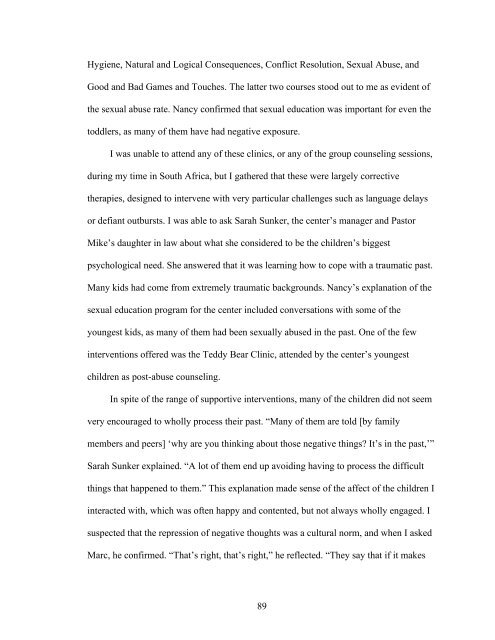INSTITUTIONALIZED CHILD CARE IN URBAN SOUTH AFRICA
You also want an ePaper? Increase the reach of your titles
YUMPU automatically turns print PDFs into web optimized ePapers that Google loves.
Hygiene, Natural and Logical Consequences, Conflict Resolution, Sexual Abuse, and<br />
Good and Bad Games and Touches. The latter two courses stood out to me as evident of<br />
the sexual abuse rate. Nancy confirmed that sexual education was important for even the<br />
toddlers, as many of them have had negative exposure.<br />
I was unable to attend any of these clinics, or any of the group counseling sessions,<br />
during my time in South Africa, but I gathered that these were largely corrective<br />
therapies, designed to intervene with very particular challenges such as language delays<br />
or defiant outbursts. I was able to ask Sarah Sunker, the center’s manager and Pastor<br />
Mike’s daughter in law about what she considered to be the children’s biggest<br />
psychological need. She answered that it was learning how to cope with a traumatic past.<br />
Many kids had come from extremely traumatic backgrounds. Nancy’s explanation of the<br />
sexual education program for the center included conversations with some of the<br />
youngest kids, as many of them had been sexually abused in the past. One of the few<br />
interventions offered was the Teddy Bear Clinic, attended by the center’s youngest<br />
children as post-abuse counseling.<br />
In spite of the range of supportive interventions, many of the children did not seem<br />
very encouraged to wholly process their past. “Many of them are told [by family<br />
members and peers] ‘why are you thinking about those negative things? It’s in the past,’”<br />
Sarah Sunker explained. “A lot of them end up avoiding having to process the difficult<br />
things that happened to them.” This explanation made sense of the affect of the children I<br />
interacted with, which was often happy and contented, but not always wholly engaged. I<br />
suspected that the repression of negative thoughts was a cultural norm, and when I asked<br />
Marc, he confirmed. “That’s right, that’s right,” he reflected. “They say that if it makes<br />
89


